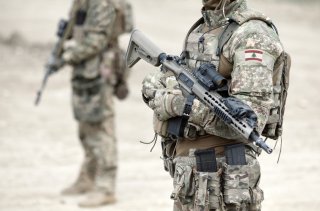Clashes in North Lebanon Raise Fears of Sectarian Violence
The town of Bcharre erupted in anger after the sudden murder of two residents.
Over the weekend, two men from the town of Bcharre in Lebanon’s Qornet al-Sawda region were shot dead with little understanding of the cause. Their names were Haitam Tawk, thirty-eight, and Malek Tawk, in his fifties. The town erupted in anger and mourned the loss of their fellow residents. Developments are still unfolding and rumors about why it happened are circulating across social media. Reports say the killers came from the Danniyeh region. The Lebanese Armed Forces (LAF) was deployed in the area to restore order and calm. But for how long can the army keep the peace if the judiciary fails to deliver appropriate legal action?
There is a combined effort by the LAF and those in a place of authority to mitigate further potential harm resulting from these killings. The press office of Lebanese caretaker Prime Minister Najib Mikati said action will be taken to apprehend the culprits. “We condemn this incident and those responsible will be arrested, so that justice can be done.”
Lebanese Forces member of parliament (MP) Sethrida Geagea, who represents the constituency of Bcharre, reached out to the Lebanese Army commander, General Joseph Aoun, to discuss the situation and how best to respond to secure justice for the victim’s families and maintain peace. Geagea and her fellow MP William Touk, who represents the same municipality, released a joint statement of condemnation, demanding judicial and military intervention.
“I contacted the army commander and asked him to send a force as soon as possible to the area where the crime occurred to conduct all necessary investigations.” As of now, the LAF is performing exceptionally well with local support.
Nevertheless, the greatest concern of the town’s residents is that the perpetrators may escape without ever seeing a moment in court. However unlikely, this consternation is warranted. Lebanon’s judiciary has failed countless times to serve its role as an independent arbiter of the law, allowing criminals of all kinds to walk away. A lack of justice and lawlessness persist across Lebanon with few exceptions. However, there is another fear that this round of violence will only cause greater mistrust among different religious communities and deepen sectarian suspicion.
Religious leaders quickly came out to express their own condemnation and add that this horrific act should not be seen through sectarian eyes. The mufti of Tripoli and the North district, Sheikh Mohammad Imam, and Archbishop of the Maronite Archdiocese of Tripoli, Bishop Youssef Soueif, released a statement asking residents of both towns to respond with patriotism and give the authorities time to work. They called on "our dear people in both regions to deal with this tragedy with spiritual and humanitarian consciousness, as well as with a high sense of national responsibility, based on full confidence in the Lebanese Army, security forces, and competent judiciary."
This problem has its historical roots in a land dispute between the two towns. Bcharre and Donieh are geographically located in a mountainous region where there are quarrels about property and water rights, especially after the snow begins to melt. Former Minister of Social Affairs Dr. Richard Kouyoumjian spoke with the National Interest on the old land feud and what course of action should be taken regarding the killers.
“It’s a chronic conflict; it’s been there for many years now. Every year after it stops snowing, there are conflicts over water between the two areas. It happens that one is Sunni Muslim and the other is Christian. But it is a land conflict over the ownership of a territory called Qornet al-Sawda, where there is plenty of water and everyone wants to benefit from it.”
Kouyoumjian further added that violence cannot be a legitimate tool to end this problem. “Using weapons and armed conflict is not the solution.”
Both towns say the water resources belong to them, and until this is independently arbitrated by the local magistrate and backed by the government, tensions will continue to grow with a high risk of more violence occurring. The former minister said to TNI, “Definitely, the criminals must be brought to justice, so that the victims can rest in peace and that the families can have closure. Also, to prove that there is some form of government left in Lebanon.”
Everyone is now waiting for what will happen next. For now, the army’s presence is the guarantor of stability in the region. But if the fallen are not honored and the courts fail to resolve this dispute, can everlasting peace be truly secured?
Adnan Nasser is an independent foreign policy analyst and journalist with a focus on Middle East affairs. Follow him on Twitter @Adnansoutlook29.
Image: Shutterstock.

